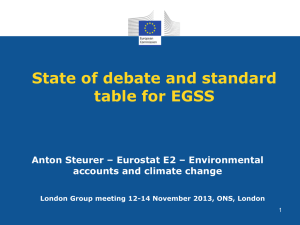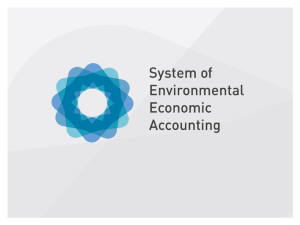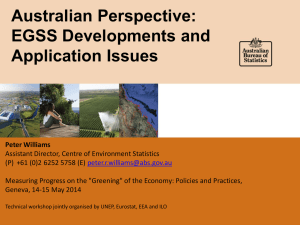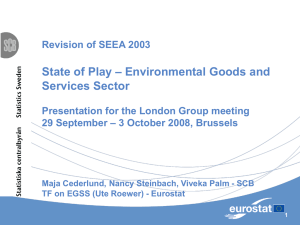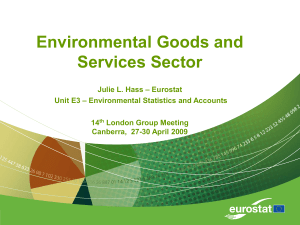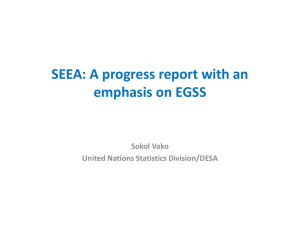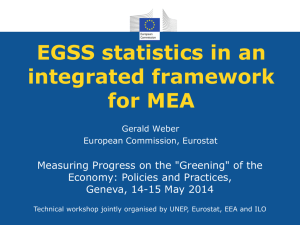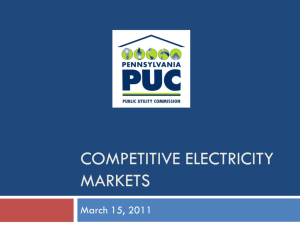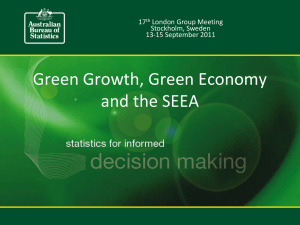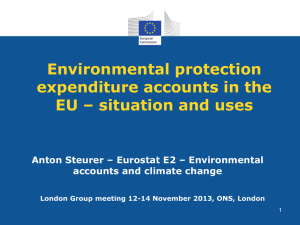Environmental activity accounts Sjoerd Schenau
advertisement
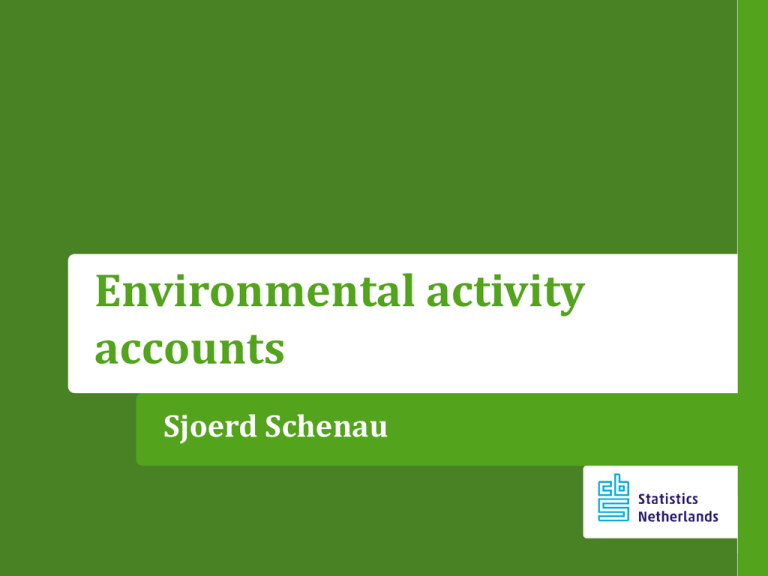
Environmental activity accounts Sjoerd Schenau Content • • • • What are environmental activity accounts ? What is the EGSS ? Application: the EGSS in the Netherlands Exercise 2 Environmental activity accounts Final demand Sectors Industries Assets Financial and produced assets, opening balance Natural resource assets, opening balance Natural resource assets, opening balance Industrial output of goods and services Sectors Wastes Commodities EGSS output Industrial intermediate demand Final demand Gross fixed capital formation Environmental protection expenditures Environmental protection expenditures Capital expenditures for environmental protection Resource production by industries Resource production by households/gov’t Resource use by industries Resource use by households/gov’t Waste consumption by industries Waste consumption by households/gov’t Waste output by industries Waste output by households/gov’t Other changes in volume & holding gains/losses on financial & produced assets Changes in and holding gains/losses on natural resource assets Changes in natural resource assets Financial and produced assets, closing balance Natural resource assets, closing balance Natural resource assets, closing balance 3 Scope and definition of environmental activities – The scope of environmental activities include those economic activities whose primary purpose is to reduce or eliminate pressures on the environment or to make more efficient use of natural resources. Environmental protection Resource management – Primary purpose criterion 4 Classification of environmental activities 5 Environmental activity accounts in SEEA-CF • • • • • Environmental protection expenditure accounts (EPEA) Environmental goods and service sector (EGSS) Environmental taxes Environmental subsidies and similar transfers Environmental permits 6 Environmental goods and service sector: EGSS • Supply side of environmental activities production of environmental goods and services • Aim: assessing the contribution of EGSS to the total economy and its employment potential • Key indicators: Total production, total employment, total value added, total exports, total gross fixed capital • Europe: EGSS part legislation on Environmental accounts (Regulation No 691 ) 7 Scope and definition The EGSS consists of producers of all environmental goods and services Thus, all products that are produced, designed and manufactured for purposes of environmental protection and resource management are within scope of the EGSS. Environmental specific services, connected products, adapted goods and environmental technologies ‘Main purpose’ criterion (technical nature of product or activity / intension of the producer) 8 Table for the EGSS 9 EGSS in the Netherlands: Overview Eight year experience in the field of EGSS Work carried out in national accounts department, as part of environmental accounts work programme Development in earlier years, statistic is since 2010 ‘in production’ (annual publication of data). Work load: approximately 0,4 FTE every year. Further development is still going on. Learning by doing aspect is very important. Every year methods are fine tuned and populations have been changed due to new insights. 10 Methodology: activity approach versus product approach Product approach: Identify environmental environmental goods and services in source data Activity approach: Identify environmental activities in source data Data sources: surveys (new or already existing), statistics, SNA, external reports Netherlands: Many different environmental activities have been identified by Statistics Netherlands as EGSS activities For every activity a specific methodology has been developed in order to compile the data 11 Overview: activites in EGSS (Netherlands) 1) Sewage and refuse disposal services (ISIC 37-39) 2) Recycling (ISIC 38.3) 3) Wholsale in waste and scrap 12 Overview: activites in EGSS (Netherlands) 4) Renewable energy production 5) Production of energy saving and sustainable energy systems 6) Insulation activities 13 Overview: activites in EGSS (Netherlands) 7) Production of environmental equipment 8) Environmental advise, environmental engeneering 9) Environmental technical construcion 14 Overview: activites in EGSS (Netherlands) 10) Environmental related inspection 11) Second hand shops 12) Organic agriculture 15 Overview: activites in EGSS (Netherlands) 13) Own account activities 14) Government governance related to the environment 15) Environmental non profit organisations 16) Environmental education 16 Many different data sources…….. 17 Most important data sources 1. SNA data environmental services 2. Own constructed data base of environmental companies plus production statistics (PRODCOM), international trade statsitics etc. 3. Government statistics 4. Agricultural statistics 5. Labour registers 6. EPEA 18 Employment, production and value added in the EGSS 19 Distribution of value added EGSS over different activities, 2011 20 Example: Monitor sustainable energy sector • The Ministry of Economic Affairs requested more detailed economic information on the sustainable energy sector • In spring 2011 Statistics Netherlands executed an in depth study on the sustainable energy sector. • Results will be updated every year and used for policy making and policy evaluation • 2013: National energy agreement between government, industries, other stakeholders • 2014: fist National energy report 21 Share of renewable energy (%) 22 Scope: What is the sustainable energy sector ? Energy related part part of the EGSS – The exploitation phase: The actual production of renewable energy – The pre-exploitation phase: The companies that are active in the value chain that precedes the production of renewable energy E.g.: o o o o Production of solar panels R&D aimed on sustainable energy technologies Transport of wind turbines Trade in solid biomass • Includes energy saving 23 Indicators • Employment (fte) • Monetary indicators (in current prices) • Gross value added = Production minus intermediate use • Production • Export and import • Investments • Innovation • Patent requests 24 Sustainable energy sector as part of the economy 25 Employment +13% 19100 fte FTE 25,000 16900 fte 20,000 P-SES (nonspecialised) 15,000 P-SES (specialised) 10,000 E-SES 5,000 0 2008 2009 2010 2011 26 Employment per technology (pre-exploitation) 6,000 Solar 5,000 Bio 4,000 Wind 3,000 2,000 Heat & geo thermal energy /energy from water 1,000 Energy saving 0 2008 2009 2010 2011 Electric transport, Smart grids/ Hydrogen technology/ CO2 capture and storage 27 Some key issues….. International comparison data Scope Methodology Data sources The more effort, the larger the EGSS ? Cleaner goods / resource efficient goods Integration in EPEA / ReMEA Dissemination of the results 28 Questions ??? 29
